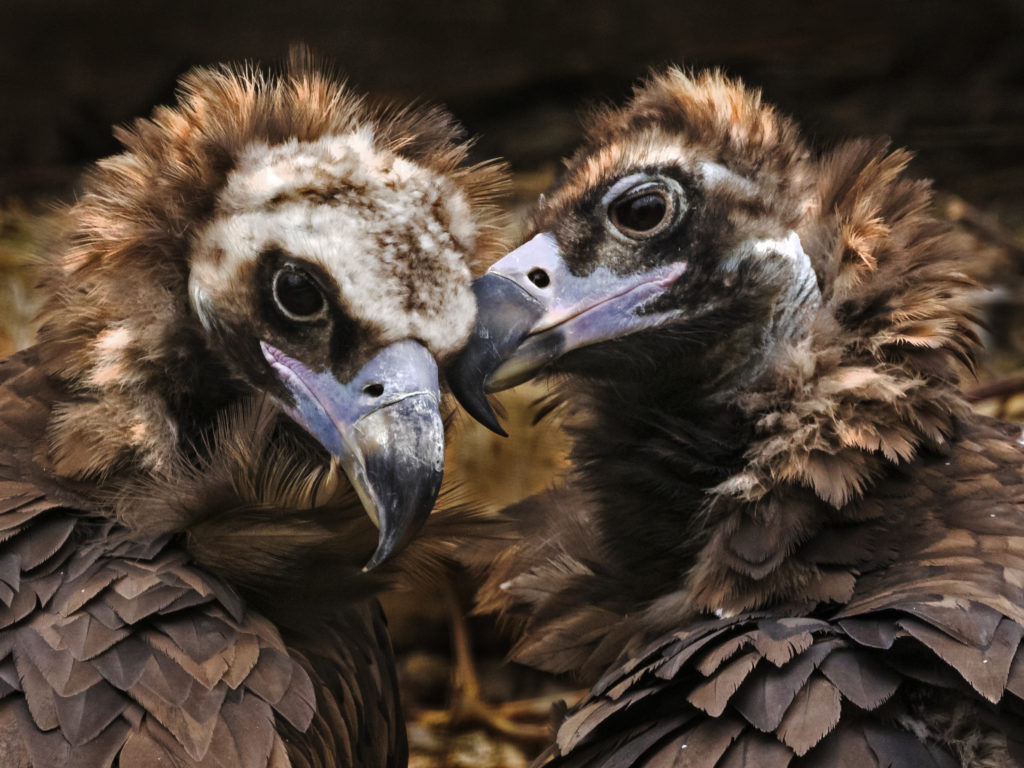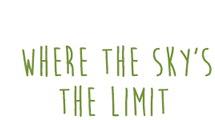

Here at the Hawk Conservancy Trust we are fortunate enough to have had Cinereous Vultures in our collection for many years. An iconic vulture and one of the largest we house.
In the wild, Cinereous Vultures have struggled throughout Europe. In the last 200 years they declined significantly across much of their range, and became extinct in seven countries, largely due to poisoning, habitat loss and a reduced food supply. However, reintroduction projects have seen the species return in countries such as France, Portugal and Bulgaria, which is fantastic. In Spain, they have recovered particularly well, where there are now more than 2000 pairs.
With the populations still recovering, Cinereous Vultures are managed throughout various parks, like the Trust, under an EAZA EEP (The European Association of Zoos and Aquaria which runs the European Endangered Species Programme).
Here at the Trust we have three Cinereous Vultures. Delores (who is a firm favourite for many members) and a bonded pair, named Thor and Aldara. These two birds have seen some rather big changes to their home earlier this year and we are hoping that they may breed. It would be a first for us here at the Trust, and contribute to the global population.
The male, Thor, is 32 years old and Aldara, his younger partner, is 21. Both of these birds came to us from Spain and have been paired together since 2017. Whilst we were closed to the public in January, one of our projects included refurbishing the aviary housing Thor and Aldara.
This pair are both quite nervous in character so we had to be careful to ensure we moved them safely before work could begin. A new nest platform and house area was constructed, new perches added, a change of substrate on the ground and we fitted cameras to allow us to monitor their activity. So lots of work! A big thank you to the members who came to help us out on our Members’ Working Day when we moved a LOT of sand into that aviary.
Since completing the work, Thor and Aldara have moved back in and have settled in nicely, taking very well to the alterations. They have been seen (and sometimes heard!) mating and they are now incubating an egg. Our whole team are so excited and are waiting with baited breath. It’s still very early days and more likely that they won’t be successful in their first year but fingers crossed that we’ll be able to share news with you in the next couple of months of a chick!

| Cookie | Duration | Description |
|---|---|---|
| cookielawinfo-checkbox-advertisement | 1 year | Set by the GDPR Cookie Consent plugin, this cookie is used to record the user consent for the cookies in the "Advertisement" category . |
| cookielawinfo-checkbox-analytics | 11 months | This cookie is set by GDPR Cookie Consent plugin. The cookie is used to store the user consent for the cookies in the category "Analytics". |
| cookielawinfo-checkbox-functional | 11 months | The cookie is set by GDPR cookie consent to record the user consent for the cookies in the category "Functional". |
| cookielawinfo-checkbox-necessary | 11 months | This cookie is set by GDPR Cookie Consent plugin. The cookies is used to store the user consent for the cookies in the category "Necessary". |
| cookielawinfo-checkbox-others | 11 months | This cookie is set by GDPR Cookie Consent plugin. The cookie is used to store the user consent for the cookies in the category "Other. |
| cookielawinfo-checkbox-performance | 11 months | This cookie is set by GDPR Cookie Consent plugin. The cookie is used to store the user consent for the cookies in the category "Performance". |
| viewed_cookie_policy | 11 months | The cookie is set by the GDPR Cookie Consent plugin and is used to store whether or not user has consented to the use of cookies. It does not store any personal data. |
| _GRECAPTCHA | 5 months 27 days | This cookie is set by the Google recaptcha service to identify bots to protect the website against malicious spam attacks. |
| Cookie | Duration | Description |
|---|---|---|
| player | 1 year | Vimeo uses this cookie to save the user's preferences when playing embedded videos from Vimeo. |
| ServerPool | session | This cookie is set by the provider Tripadvisor. This cookie is used for user tracking and viewing embedded contents from TripAdvisor like payment of referral commission fees etc. |
| sp_landing | 1 day | The sp_landing is set by Spotify to implement audio content from Spotify on the website and also registers information on user interaction related to the audio content. |
| sp_t | 1 year | The sp_t cookie is set by Spotify to implement audio content from Spotify on the website and also registers information on user interaction related to the audio content. |
| TASession | session | This cookie is set by the provider Tripadvisor. This cookie is used for user tracking and viewing embedded contents from TripAdvisor like payment of referral commission fees etc. |
| TASSK | 5 months 27 days | This cookie is set by the provider Tripadvisor. This cookie is used for viewing embedded contents to the visitor from Tripadvisor. It also helps to know whether the visitor had clicked on the advertisement, to collect payment from the Tripadvisor. |
| TATravelInfo | 14 days | This cookie is set by the provider Tripadvisor. This cookie is used for viewing contents and ads from Tripadvisor, which in return helps to earn money from Tripadvisor if the visitor has clicked the ads. |
| __cf_bm | 30 minutes | This cookie, set by Cloudflare, is used to support Cloudflare Bot Management. |
| Cookie | Duration | Description |
|---|---|---|
| sync_active | never | This cookie is set by Vimeo and contains data on the visitor's video-content preferences, so that the website remembers parameters such as preferred volume or video quality. |
| __smVID | 1 month | Sumo sets this cookie for sign-up prompt purposes when visitors visit a website. |
| Cookie | Duration | Description |
|---|---|---|
| CONSENT | 2 years | YouTube sets this cookie via embedded youtube-videos and registers anonymous statistical data. |
| TADCID | 10 years | Tripadvisor sets this cookie to store a unique ID for users, to help them view embedded content from Tripadvisor. |
| vuid | 2 years | Vimeo installs this cookie to collect tracking information by setting a unique ID to embed videos to the website. |
| _ga | 2 years | The _ga cookie, installed by Google Analytics, calculates visitor, session and campaign data and also keeps track of site usage for the site's analytics report. The cookie stores information anonymously and assigns a randomly generated number to recognize unique visitors. |
| _gat_gtag_UA_20364160_1 | 1 minute | Set by Google to distinguish users. |
| _ga_1MTNP1Z1FC | 2 years | This cookie is installed by Google Analytics. |
| _gid | 1 day | Installed by Google Analytics, _gid cookie stores information on how visitors use a website, while also creating an analytics report of the website's performance. Some of the data that are collected include the number of visitors, their source, and the pages they visit anonymously. |
| Cookie | Duration | Description |
|---|---|---|
| fr | 3 months | Facebook sets this cookie to show relevant advertisements to users by tracking user behaviour across the web, on sites that have Facebook pixel or Facebook social plugin. |
| SRT | session | This cookie is set by the provider Tripadvisor. This is a Tripadvisor session cookie used for advertising purposes. |
| TACds | 2 months | This cookie is set by the provider TripAdvisor. This cookie is used for showing travel information and ads based on the user preferences. |
| TART | 5 days | This cookie is set by the provider Tripadvisor. This cookie is used for viewing contents and ads from Tripadvisor, which in return helps to earn money from Tripadvisor if the visitor has clicked the ads. |
| TAUD | 14 days | This cookie is set by the provider Tripadvisor. This is Tripadvisor session cookie used for advertising purposes. |
| TAUnique | 2 years | This cookie is set by the provider TripAdvisor. This cookie is used for showing travel information and ads based on the user preferences. |
| VISITOR_INFO1_LIVE | 5 months 27 days | A cookie set by YouTube to measure bandwidth that determines whether the user gets the new or old player interface. |
| YSC | session | YSC cookie is set by Youtube and is used to track the views of embedded videos on Youtube pages. |
| yt-remote-connected-devices | never | YouTube sets this cookie to store the video preferences of the user using embedded YouTube video. |
| yt-remote-device-id | never | YouTube sets this cookie to store the video preferences of the user using embedded YouTube video. |
| yt.innertube::nextId | never | This cookie, set by YouTube, registers a unique ID to store data on what videos from YouTube the user has seen. |
| yt.innertube::requests | never | This cookie, set by YouTube, registers a unique ID to store data on what videos from YouTube the user has seen. |
| _fbp | 3 months | This cookie is set by Facebook to display advertisements when either on Facebook or on a digital platform powered by Facebook advertising, after visiting the website. |
| Cookie | Duration | Description |
|---|---|---|
| loglevel | never | No description available. |
| PMC | 2 years | No description |
| TASID | 30 minutes | No description |
| _dc_gtm_UA-20364160-1 | 1 minute | No description |
| __smSessionId | 9 hours | No description available. |
| __smToken | 1 year | This cookie is set by the Sumo. This cookie is used for verifying whether the user is logged in or not. |
| __vt | 1 hour | No description |




